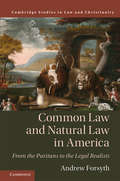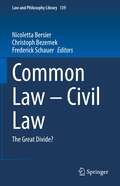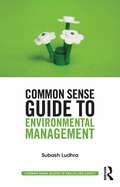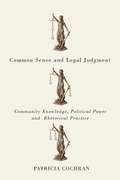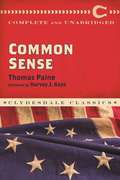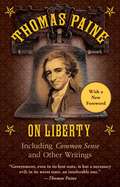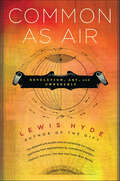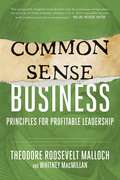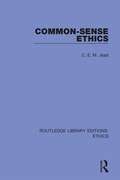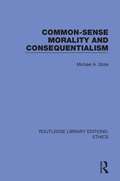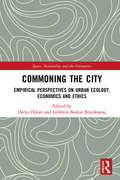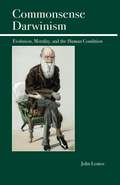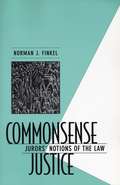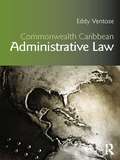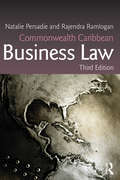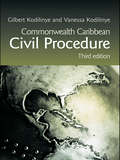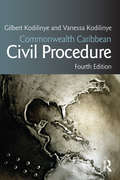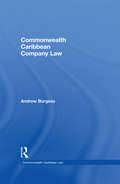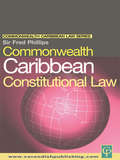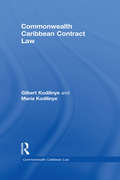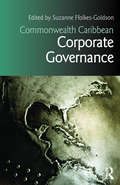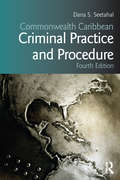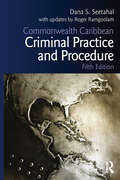- Table View
- List View
Common Law and Natural Law in America: From the Puritans to the Legal Realists (Law and Christianity)
by Andrew ForsythSpeaking to today's flourishing conversations on both law, morality, and religion, and the religious foundations of law, politics, and society, Common Law and Natural Law in America is an ambitious four-hundred-year narrative and fresh re-assessment of the varied American interactions of 'common law', the stuff of courtrooms, and 'natural law', a law built on human reason, nature, and the mind or will of God. It offers a counter-narrative to the dominant story of common law and natural law by drawing widely from theological and philosophical accounts of natural law, as well as primary and secondary work in legal and intellectual history. With consequences for today's natural-law proponents and critics alike, it explores the thought of the Puritans, Revolutionary Americans, and seminal legal figures including William Blackstone, Joseph Story, Christopher Columbus Langdell, Oliver Wendell Holmes, and the legal realists.
Common Law – Civil Law: The Great Divide? (Law and Philosophy Library #139)
by Frederick Schauer Christoph Bezemek Nicoletta BersierThis book offers an in-depth analysis of the differences between common law and civil law systems from various theoretical perspectives. Written by a global network of experts, it explores the topic against the background of a variety of legal traditions.Common law and civil law are typically presented as antagonistic players on a field claimed by diverse legal systems: the former being based on precedent set by judges in deciding cases before them; the latter being founded on a set of rules intended to govern the decisions of those applying them. Perceived in this manner, common law and civil law differ in terms of the (main) source(s) of law; who is to create them; who is (merely) to draw from them; and whether the law itself is pure each step of the way, or whether the law’s purity may be tarnished when confronted with a set of contingent facts. These differences have deep roots in (legal) history – roots that allow us to trace them back to distinct traditions. Nevertheless, it is questionable whether the divide thus depicted is as great as it may seem: international and supranational legal systems unconcerned by national peculiarities appear to level the playing field. A normative understanding of constitutions seems to grant ever-greater authority to High Court decisions based on thinly worded maxims in countries that adhere to the civil law tradition. The challenges contemporary regulation faces call for ever-more detailed statutes governing the decisions of judges in the common law tradition. These and similar observations demand a structural reassessment of the role of judges, the power of precedent, the limits of legislation and other features often thought to be so different in common and civil law systems. The book addresses this reassessment.
Common Legal Framework for Takeover Bids in Europe
by Dirk Van GervenThe Council Directive of 21 April 2004 on takeover bids sets forth the general principles applicable to takeover bids and clarifies certain minimum rules with respect to the procedure for a takeover bid, the obligation to make a mandatory bid in the event a minimum threshold is crossed and the majority shareholder's squeeze-out right as well as the minority shareholders' sell-out right. Furthermore, the Directive defines the authority which is competent to approve offer documents and supervise takeover bids, and provides for optional restrictions on the actions of the target company's management and on defence mechanisms. This book discusses the Takeover Directive and its implementing rules in each Member State of the European Union and the European Economic Area, providing companies and their advisors with useful insight into the legal framework and principles applicable to takeover bids in the region.
Common Sense Guide to Environmental Management
by Subash LudhraAn essential and short guide for those who need to know more about environmental management in the workplace without wanting to spend hours reading dozens of different documents. Whether it’s for use alongside a training course or simply to brush up on your knowledge, it’s perfect for equipping you with the principles of environmental management. Friendly and accessible, this Common Sense Guide covers all the main aspects of environmental management in manageable chapters to provide you with the knowledge and understanding you need to look after the environment and those around you. Suitable for those with little understanding of environmental management Includes questions at the end of each module to consolidate your environmental management knowledge Certificate offered to those who complete the exam at the end of the book and return to be marked externally.
Common Sense and Legal Judgment: Community Knowledge, Political Power, and Rhetorical Practice
by Patricia CochranWhat does it mean when a judge in a court of law uses the phrase “common sense”? Is it a type of evidence or a mode of reasoning? In a world characterized by material and political inequalities, whose common sense should inform the law? Common Sense and Legal Judgment explores this rhetorically powerful phrase, arguing that common sense, when invoked in political and legal discourses without adequate reflection, poses a threat to the quality and legitimacy of legal judgment. Often operating in the service of conservatism, populism, or majoritarianism, common sense can harbour stereotypes, reproduce unjust power relations, and silence marginalized people. Nevertheless, drawing the works of theorists such as Thomas Reid, Antonio Gramsci, and Hannah Arendt into conversation with rulings by the Supreme Court of Canada, Patricia Cochran demonstrates that with careful attention, the democratic, egalitarian, and community-sustaining aspects of common sense can be brought to light. A call for critical self-reflection and the close scrutiny of power relationships and social contexts, this book is a direct response to social justice predicaments and their confounding relationships to law. Creative and interdisciplinary, Common Sense and Legal Judgment reinvigorates feminist and anti-poverty understandings of judgment, knowledge, justice, and accountability.
Common Sense: Addressed To The Inhabitants Of America
by Thomas Paine Harvey KayePackaged in handsome, affordable trade editions, Clydesdale Classics is a new series of essential works. From the musings of famed scholars such as Plato in Republic to the striking personal narrative of Harriet Jacobs in Incidents in the Life of a Slave Girl, this new series is a comprehensive collection of our intellectual history through the words of the exceptional few.Common Sense is a compelling work written by famed philosopher and political thinker Thomas Paine to champion the United States’ independence from Great Britain. It is often dubbed the bestselling American title of all time, proportionately, although no sales numbers were recorded to support this claim. The pamphlet addresses the issues with monarchy and tyranny in England, as well as the problems with the English Constitution. Additionally, Paine comments on the capabilities of America as an independent nation, as well as its contemporary state of affairs.With its sensible and beautiful prose, as well as the inclusion of a brand-new foreword by historian Harvey J. Kaye, this edition of Paine’s Common Sense is sure to spark passion and pride in American readers just as it did 240 years ago.
Common Sense: and Other Writings
by Thomas Paine Alan DershowitzThomas Paine is most famous for writing Common Sense, a pamphlet distributed during the American Revolution advocating for colonial America's independence from Great Britain. Now, collected here in a beautiful gift book volume, are excerpts from this important historical American document, as well as several of his other writings. This volume is introduced by Alan Dershowitz, Professor of Law, Emeritus at Harvard Law School and a noted civil liberties advocate. Paine believed in more than just freedom in the form of revolution and overthrowing governments. He also believed in freedom from oppressive and organized religions and monopolies. Included in this book are passages taken from The Age of Reason and The Rights of Man, as well as letters to George Washington, Benjamin Rush, and Samuel Adams, and pamphlets such as "The American Crisis" and "Agrarian Justice." Throughout his writings, Paine provides excellent and timeless wisdom on attaining liberty and living a democratic life.
Common Values
by Sissela BokIn this book, Sissela Bok asks what moral values, if any, might be capable of being shared across national, ethnic, religious, and other boundaries, under what circumstances, and with what qualifications. As the twentieth century draws to a close, societies confront challenges and threats - whether from environmental or military or from epidemics such as cholera or AIDS - that cross every boundary. Responses, to be effective, must be collective as well; yet they cannot begin to be effective, Bok suggests, without greater stress on common values and goals.
Common as Air: Revolution, Art, and Ownership
by Lewis HydeCommon as Air offers a stirring defense of our cultural commons, that vast store of art and ideas we have inherited from the past that continues to enrich our present. Suspicious of the current idea that all creative work is "intellectual property," Lewis Hyde turns to America's founding fathers—men like John Adams, James Madison, and Thomas Jefferson—in search of other ways to value the fruits of human wit and imagination. What he discovers is a rich tradition in which knowledge was assumed to be a commonwealth, not a private preserve.For the founding fathers, democratic self-governance itself demanded open and easy access to ideas. So did the growth of creative communities, such as that of eighteenth-century science. And so did the flourishing of public persons, the very actors whose "civic virtue" brought the nation into being.In this lively, carefully argued, and well-documented book, Hyde brings the past to bear on present matters, shedding fresh light on everything from the Human Genome Project to Bob Dylan's musical roots. Common as Air allows us to stand on the shoulders of America's revolutionary giants and to see beyond today's narrow debates over cultural ownership. What it reveals is nothing less than an inspiring vision of how to reclaim the commonwealth of art and ideas that we were meant to inherit.
Common-Sense Business: Principles for Profitable Leadership
by Theodore Roosevelt Malloch Whitney MacMillan“Has the potential to transform how all companies are run…Nothing could be more valuable!”—Mark Drewell, CEO, Globally Responsible Leadership Initiative (GRLI) From two of the world’s most successful business leaders comes Common-Sense Business—an accessible, actionable guide to better leadership, increased profits, and a more sustainable economic model predicated on prudence and socially conscious business. Common sense and prudence have long been among the guiding tenets of society, but in today’s economy they have been completely abandoned in the interest of blindly maximizing profits. Common-Sense Business shows that this current economic model is both detrimental and unsustainable, and that we must transform the global economy along the lines of common sense toward the common good. Ted Malloch, a thought leader and policy influencer in global economic strategy, and Whitney MacMillan, the former chairman and CEO of the world’s largest private corporation, draw on recent research, history’s greatest minds, and their own successes to explain that ethically driven business is both a moral and financial necessity. Inspired by Thomas Paine’s Common Sense, this work explains to readers in all walks of life that ethically driven business will lead to better long-term profits, larger customer bases and more positive customer relations, and a holistically improved business. This book is a must-read for business owners, entrepreneurs, students, and businessmen and women in all sectors of the economy.
Common-Sense Ethics
by C. E. JoadOriginally published in 1921, this book makes philosophical ethics accessible to the non-philosopher and applies them to problems of everyday life. The author maintains that morality is the rationalization of the impulse to blame and emphases the importance of impulses. He illustrates how modern society conspires to suppress impulses and restrict their operation.
Common-Sense Morality and Consequentialism
by Michael A. SloteOriginally published in 1985 and now re-issued with a new preface, this study assesses the two major moral theories of ethical consequentialism and common-sense morality by means of mutual comparison and an attempt to elicit the implications and tendencies of each theory individually. The author shows that criticisms and defences of common-sense morality and of consequentialism give inadequate characterizations of the dispute between them and thus at best provide incomplete rationales for either of these influential moral views. Both theories face inherent difficulties, some familiar but others mentioned for the first time in this work. The argument proceeds by reference to historical figures like Bentham, Ross and Sidgwick and to contemporary thinkers such as Williams, Nagel, Hare and Sen.
Commoning the City: Empirical Perspectives on Urban Ecology, Economics and Ethics
by Derya Özkan Güldem Baykal BüyüksaraçThis collection seeks to expand the limits of current debates about urban commoning practices that imply a radical will to establish collaborative and solidarity networks based on anti-capitalist principles of economics, ecology and ethics. The chapters in this volume draw on case studies in a diversity of urban contexts, ranging from Detroit, USA to Kyrenia, Cyprus – on urban gardening and land stewardship, collaborative housing experiments, alternative food networks, claims to urban leisure space, migrants’ appropriation of urban space and workers’ cooperatives/collectives. The analysis pursued by the eleven chapters opens new fields of research in front of us: the entanglements of racial capitalism with enclosures and of black geographies with the commons, the critical history of settler colonialism and indigenous commons, law as a force of enclosure and as a strategy of commoning, housing commons from the urban scale perspective, solidarity economies as labour commons, territoriality in the urban commons, the non-territoriality of mobile commons, the new materialist and post-humanist critique of the commons debate and feminist ethics of care.
Commonsense Darwinism: Evolution, Morality, And The Human Condition
by John LemosWritten in a simple, accessible style, Commonsense Darwinism offers a clear, critical examination of the subject. Assuming that the diversity of life, including human beings, is the result of evolution from common origins and that its driving force is natural selection, the book explores what this might mean for issues in ethics, philosophy of religion, epistemology, and metaphysics. The author’s defense of free will makes this an especially stimulating read.
Commonsense Justice: Jurors' Notions of the Law
by Norman J. FinkelFor the first time in our history, U.S. prisons house over a million inmates, enough to populate a city larger than San Francisco. Building prisons is the new growth industry, as the American public reacts to a perceived increase in violence and politicians take a hard line toward crime. But this eagerness to construct more prisons raises basic questions about what the community wants and will tolerate and what the Supreme Court will sanction. In this timely book, Norman Finkel looks at the relationship between the "law on the books," as set down in the Constitution and developed in cases and decisions, and what he calls "commonsense justice," the ordinary citizen's notions of what is just and fair. Law is an essentially human endeavor, a collection of psychological theories about why people think, feel, and behave as they do, and when and why we should find some of them blameworthy and punishable. But is it independent of community sentiment, as some would contend? Or, as Finkel suggests, do juries bring the community's judgment to bear on the moral blameworthiness of the defendant? When jurors decide that the law is unfair, or the punishment inappropriate for a particular defendant, they have sometimes nullified the law. Nullification represents the jury's desire not to defeat but "to perfect and complete" the law. It is the "no confidence" vote of commonsense justice refusing to follow the path the law has marked out--and pointing to a new path based on what seem to be more just grounds. Finkel brings to life the story behind the jury and judicial decisions, interweaving anecdotes, case law, and social science research to present a balanced and comprehensive view of important legal and social policy issues.
Commonwealth Caribbean Administrative Law: Commonwealth Caribbean Administrative Law (Commonwealth Caribbean Law Ser.)
by Eddy VentoseCommonwealth Caribbean Administrative Law comprehensively explores the nature and function of administrative law in contemporary Caribbean society. It considers the administrative machinery of Caribbean States; Parliament, the Executive and the judiciary. It then examines the basis for judicial review of executive and administrative action in the Caribbean by looking at the statutory provisions that underpin this and the plethora of case law emerging from the region. The book will also look to how the courts in the Commonwealth Caribbean have sought to define principles of administrative law. This book will also consider the alternative methods by which the rights of citizens are protected, including the ombudsman and the use of tribunals and inquiries, as well as looking forward to the increasingly significant role of Caribbean Integration law and bodies such as CARICOM and the OESC.
Commonwealth Caribbean Business Law (Commonwealth Caribbean Law)
by Natalie Persadie Rajendra RamloganNow in its third edition, Commonwealth Caribbean Business Law continues to break away from the traditional English approach of treating business law primarily as the law of contract and agency. Taking a panoramic view, it explores the foundation of various legal systems before examining areas of legal liability that affect business activities. These include areas such as contract law, tort law, criminal law, agency and internet law which present significant challenges confronting the business sector. The book primarily targets the development of business law principles in several Caribbean Commonwealth jurisdictions but, where appropriate, also embraces the jurisprudence of other Commonwealth nations, such as the United Kingdom, Canada and Australia. It also explores the United States as a non-Commonwealth jurisdiction, given the increasing importance in the Caribbean of judicial pronouncements relating to internet law from this territory. Using excerpts from key judgments, the book allows students, particularly those with a non-legal background, to understand key legal principles for business as presented by the judiciary and draws parallels between legal theory and business practice.
Commonwealth Caribbean Civil Procedure
by Gilbert Kodilinye Vanessa KodilinyeThis new edition of a well-established book is a timely response to the enactment during the past 3 to 5 years of new rules of civil procedure which are now in force, or are soon coming into force in the vast majority of Caribbean jurisdictions. The third edition has been substantially revised and augmented to take into account the revision of the rules and covers the new rules in detail. The book also provides coverage of the recent case-law coming out of Jamaica and the Organisation of Eastern Caribbean States (OECS), under the new rules of civil procedure. This book is essential reading for students of Commonwealth Caribbean law as well as anyone wishing to get to grips with the new rules of civil procedure.
Commonwealth Caribbean Civil Procedure (Commonwealth Caribbean Law)
by Gilbert Kodilinye Vanessa KodilinyeThis new fourth edition of a well-established book is a timely response to the continuing development of the new rules of civil procedure in force in most of the jurisdictions of the English-speaking Caribbean. The new edition has been substantially revised to cover amendments to, and recent case law interpreting and applying, the Civil Procedure Rules of the various territories. It is essential reading for law students and legal practitioners in the region.
Commonwealth Caribbean Company Law (Commonwealth Caribbean Law)
by Andrew BurgessIn the last twenty five years, company law in the Commonwealth Caribbean has undergone dramatic changes, from a model influenced by English law to a new, harmonised collection of regional legislation based on the Caricom and CLI model Acts that vary substantially across Caricom member states. The variation within Caribbean company law presents an enormous challenge, both in terms of the breadth of the subject and in addressing the difference in provisions of one state’s Company Law Act as opposed to another. Using the Caricom model Act and CLI model Act as a basis for its structure, Commonwealth Caribbean Company Law examines and compares regional implementation of company law in an accessible and comprehensive manner that will be invaluable to students and practitioners in the region.
Commonwealth Caribbean Constitutional Law
by Fred PhillipsThis book includes the reforms proposed by the various Caribbean Commissions since 1985, making it a comprehensive guide to constitutional law in the Caribbean. It outlines sources of the law and developing changes in the doctrine of sovereignty of Parliament and the Conventions of the Constitution as well as in the role of the Public Service. There is also an expanded commentary on the Caribbean judiciary in which special reference is made to the proposed Caribbean Court of Justice.Caribbean Constitutional Law will be valuable to students of law and political science and practitioners wishing to renew their acquaintance with the basic concepts of constitutional law.
Commonwealth Caribbean Contract Law (Commonwealth Caribbean Law Ser.)
by Gilbert Kodilinye Maria KodilinyeThe first textbook on Commonwealth Caribbean Contract law for undergraduate and sixth form students, Commonwealth Caribbean Contract Law is a new and unrivalled resource on the subject. This textbook utilises Caribbean Case Law and Statutory provisions to provide a clear and immersive path into the study of contract law from a Caribbean perspective. Encompassing topics that include misrepresentation, privity, and remedies, this book expertly introduces and explains the many aspects of contract law in the Caribbean. Written by a well-established textbook author and professor of law at Mona Campus, the textbook comprehensively covers all key principles of contractual obligations studied by undergraduate students, and is relevant to practitioners in a modern and accessible way. An invaluable reference, this book is essential reading for those with an academic or professional interest in contract law.
Commonwealth Caribbean Corporate Governance (Commonwealth Caribbean Law)
by Suzanne Ffolkes-GoldsonCorporate governance initiatives have been developing at a rapid pace in the Commonwealth Caribbean through legislation, case law and codes. Commonwealth Caribbean Corporate Governance offers an overview of current practice and legal developments in corporate governance, highlighting the interpretation of the legislation through case law and the codes of corporate governance which have now been implemented. It also considers the challenges which emerging markets face in an attempt to adopt the corporate governance initiatives of developed markets. This text explores the emergence and development of corporate governance in the region from a range of angles, including the protection and empowerment of shareholders, the impact on government agencies, and the role and responsibilities of directors and officers in companies and in government agencies. Written by a panel of academics, legal practitioners and experts working in business, this book will be an invaluable resource for judges, lawyers, corporate executives and students of business, corporate law and corporate management.
Commonwealth Caribbean Criminal Practice and Procedure
by Dana S. SeetahalThe fourth edition of this best-selling book has been thoroughly revised to take into account recent developments in the law in criminal practice and procedure across the region. The only textbook that explores criminal practice and procedure as it relates to the Commonwealth Caribbean, the book clari?es the state law in each of 11 jurisdictions, at the same time making it clear when laws are the same or similar and highlighting where differences among jurisdictions occur. Both statute law and common law are examined in the relevant jurisdictions, which include Trinidad and Tobago, Guyana, Barbados, Jamaica and Grenada amongst others. The impact of statutory changes in the laws are analysed, as well as recent developments in the common law. Throughout the text the statutory law in the Commonwealth Caribbean is compared to similar English legislation, in the light of the analysis of such legislation in English case law. Commonwealth Caribbean Criminal Practice and Procedure is the recommended textbook for all profes- sional law schools in the Commonwealth Caribbean and is used at regional universities as a reference book for criminal justice students. In addition, as the only book that deals speci?cally with criminal practice and procedure in the regions, it has proved a valuable reference tool for legal practitioners, judicial officers and police officers.
Commonwealth Caribbean Criminal Practice and Procedure (Commonwealth Caribbean Law)
by Roger RamgoolamThe fifth edition of this best-selling book has been thoroughly revised to take into account recent developments in the law in criminal practice and procedure across the region. As the only textbook to explore criminal practice and procedure as it relates to the Commonwealth Caribbean, the book clarifies the state law in each of 11 jurisdictions, while at the same time making it clear when laws are the same or similar and highlighting where differences among jurisdictions occur. Both statute law and common law are examined in the relevant jurisdictions, which include Trinidad and Tobago, Guyana, Barbados, Jamaica and Grenada amongst others. The impact of statutory changes in the laws are analysed, as well as recent developments in the common law. Throughout the text the statutory law in the Commonwealth Caribbean is compared with similar English legislation, in light of the analysis of such legislation in English case law. This book is the recommended textbook for all professional law schools in the Commonwealth Caribbean and is used at regional universities as a reference book for criminal justice students. In addition, as the only book that deals specifically with criminal practice and procedure in the regions, it has proved a valuable reference tool for legal practitioners, judicial officers and police officers.
